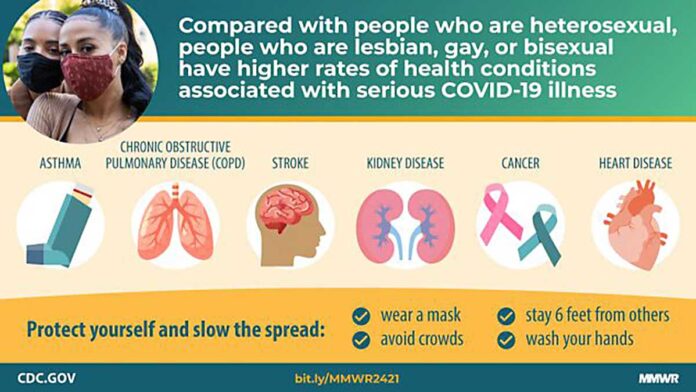Last week, a newly released CDC report found that LGBTQ people have a higher prevalence of health conditions — such as asthma, cancer, heart disease and kidney disease — than heterosexual people. As such, LGBTQ people are more at risk for severe Covid-19 cases.
Once the report started getting shared on social media, the homophobic response was swift and, sadly, predictable. It fell into two tiers. One group parroted the age-old vitriol that being LGBTQ is a lifestyle choice that does not impact physical health. Another group, along the same lines, simply could not understand, or refused to believe, why being LGBTQ would have any bearing on a person’s physical or mental health.
It’s not a difficult question. Perhaps the simplest answer comes from the CDC report itself.
“Because of their sexual orientation,” the report states, “sexual minority persons experience stigmatization and discrimination that can increase vulnerabilities to illness and limit the means to achieving optimal health and well-being through meaningful work and economic security, routine and critical health care, and relationships in which sexual orientation and gender identity can be openly expressed.”
Let’s break down that sentence into its individual parts.
First: stigmatization and discrimination that can increase vulnerabilities to illness.
Here are some examples of that: a person becoming homeless because a guardian or landlord kicked them out for being LGBTQ; a person being physically attacked because they are LGBTQ; a person denied access to a food pantry because they are LGBTQ; a teenager who starts smoking to cope with the stress of being bullied because they’re LGBTQ.
Next: stigmatization and discrimination that can limit the means to achieving optimal health and well-being through meaningful work and economic security, routine and critical health care.
Here are some examples of that: a person gets fired from their job and loses their health insurance because their employer refuses to have LGBTQ workers; a person discovers they have been paid significantly less than their colleagues because they are LGBTQ; a person who cannot find a doctor who is comfortable discussing or knowledgable about LGBTQ health needs; a person who is uncomfortable seeing a doctor because of their LGBTQ-specific issues.
Finally: stigmatization and discrimination that can limit the means to achieving relationships in which sexual orientation and gender identity can be openly expressed.
Here are some examples of that: a person whose family and friends have disowned them; a person who does not have anyone to help check in on them, or drive them to doctor’s appointments, or administer necessary medical care; a person who has nobody to advocate for them if mistreatment occurs at work, or at home, or at the hospital.
All of those examples are true. They’ve happened to countless LGBTQ people. And it doesn’t even begin to fully explore the fear and stress that comes from being discriminated against and what those who receive that discrimination must do to cope. But the next time someone says that being LGBTQ doesn’t increase one’s health risks, don’t hesitate to call them out on it.
Discrimination comes with a heavy price.

